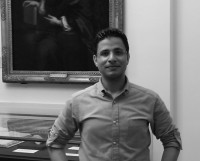Renewable Energy
Pollution
Circular Economy & Green Chemistry
Toxic Pollutants & Hazardous Substances
Post-Doctoral Fellowships
United Kingdom
2024.09.30
New Lease of Life for Critical Elements Recycled from Domestic and Commercial Electronic Waste
With the rapid advancement of technology and the increasing reliance on devices such as batteries, fuel cells, smartphones, and solar cells, our societies are facing a critical issue-an unprecedented rise in electronic waste. Less than 1% of rare earth elements and only 5% of precious metals are recycled from this waste, leading to significant environmental harm and supply chain strain. Thus, the need for effective and sustainable recycling methods is imperative. The disposal of these devices is exacerbating issues related to resource depletion and waste management.
Dr. Haytham Hussein's project at the University of Nottingham will address these challenges by developing innovative electrochemical recycling methods. The project aims to efficiently and selectively recover critical elements from complex waste such as spent rechargeable batteries, solar/fuel cells, semiconductor chips, and electronic devices. Leveraging the well-established electrochemical recovery technology, specifically electrodeposition, Dr. Hussein's project will tackle the complexity of separating and selectively recovering individual elements associated with modern electronic waste. To achieve this, the project will explore using a class of ionic liquids named Deep Eutectic Solvents, which can make separation and recovery processes more efficient, safer, and environmentally friendly. Additionally, an innovative flow electrochemical cell based on boron-doped diamond will be engineered to facilitate the electrodeposition of valuable elements for further reuse. The electrodeposition approach will utilise intermittent heating of the interface to increase the recovery efficiency. Furthermore, the project will use advanced tools such as in situ spectroscopy and microscopy to monitor and understand the whole process.
Dr. Hussein’s project promises to make significant strides in the field of sustainable recycling. By developing methods that efficiently recover critical and rare elements from complex waste streams, the project will not only help alleviate pressures on virgin resource supplies but also significantly reduce environmental pollution. Critical and rare elements are vital to several industries, including renewable energy technologies, semiconductors, and electronics manufacturing. By introducing efficient recovery methods for Critical and Rare Earth elements, Dr. Hussein's project supports the transition from a traditional linear economy to a sustainable circular economy. The innovations have the potential to drastically reduce the economic and environmental impacts associated with electronic waste, providing a robust framework for resource sustainability and environmental protection. The project's outcomes will not only enhance the efficiency of recycling processes but also bolster socio-economic stability by ensuring a steady supply of essential materials for future technological advancements.

Haytham
HUSSEIN
Institution
University of Nottingham
Country
United Kingdom
Nationality
Egyptian
Related articles
Pollution
Sustainable Living & City
Chronic & Non Communicable Diseases
Air Quality
Urban Planning
Smart Cities
Respiratory Diseases
AXA Outreach
Spain
RI-URBANS
Urban areas face increasing challenges related to air pollution, impacting public health and quality of life. The ‘Air Quality in... Read more

Fulvio
AMATO

